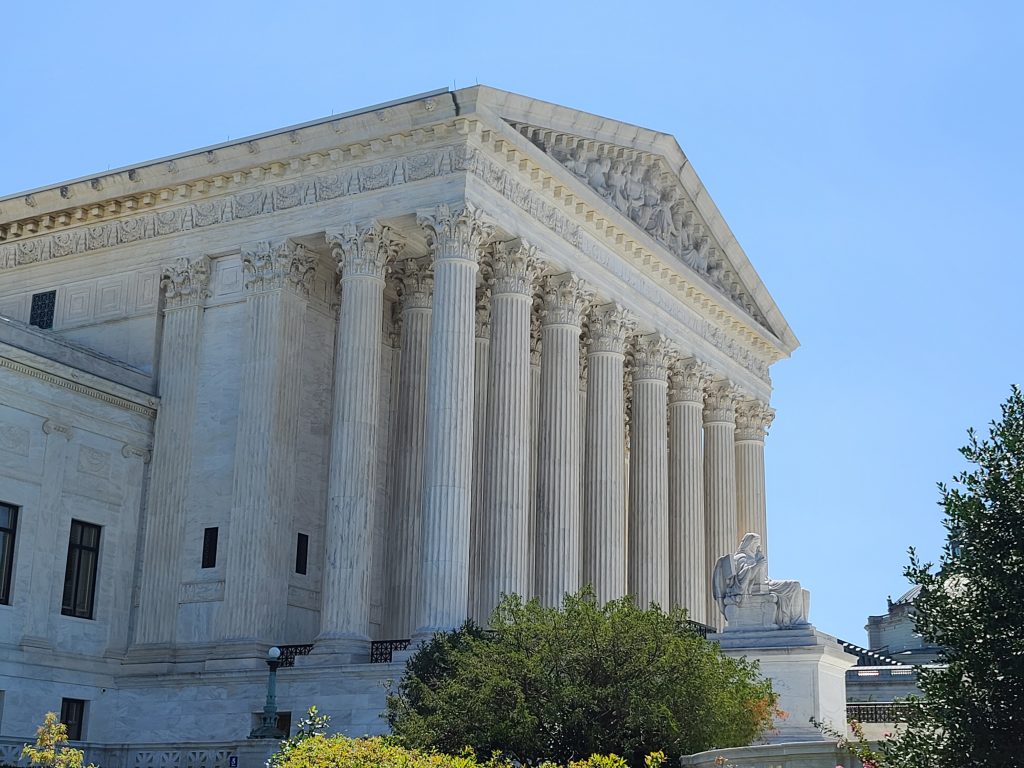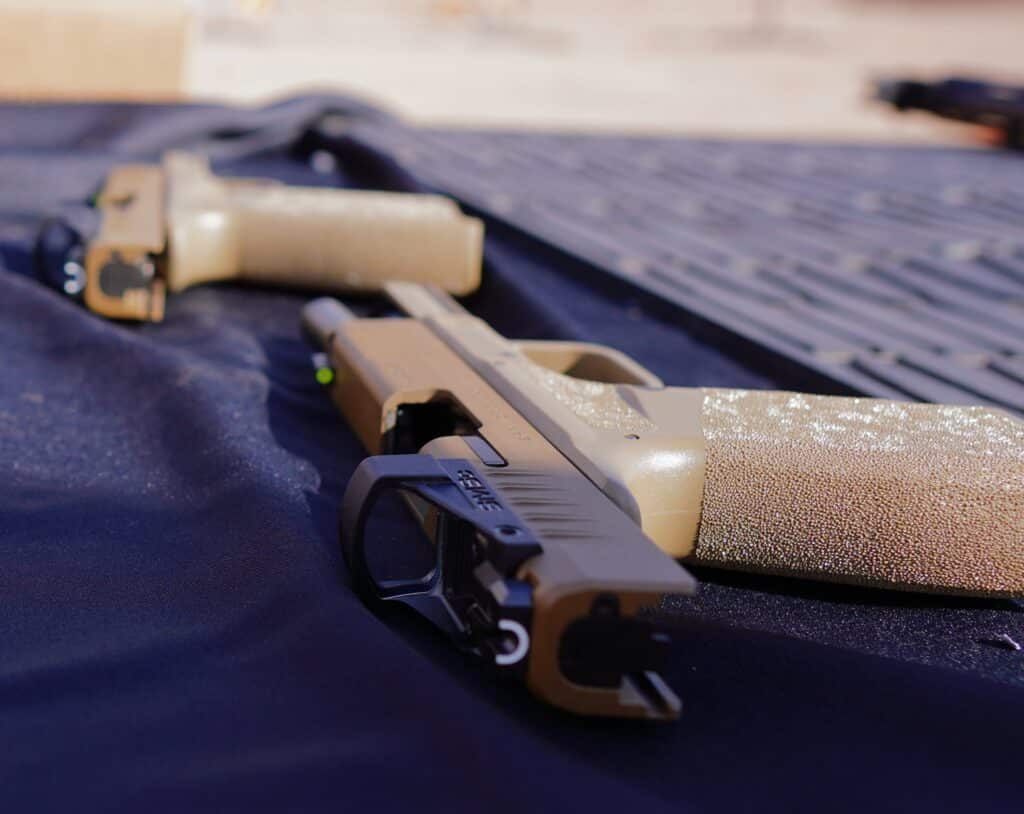There’s a new Second Amendment fight brewing that wasn’t part of the gun-rights movement’s post-Bruen strategy and could produce unexpected results.
A Fifth Circuit panel has stuck down the federal prohibition on those subject to domestic violence restraining orders owning guns. The government is likely to take the case to the Supreme Court. I explain why the High Court may (or may not) come to a different conclusion.
Contributing Writer Jake Fogleman looks at why it has been a truly terrible week for gun-control advocates in New Jersey. Two different federal courts ruled against two different post-Bruen gun laws in cases that were part of the gun-rights movement’s strategy. Jake explains how that bolsters the fight against Bruen backlash laws.
Plus, New York Times best-selling fantasy author Larry Correia talks about defending the Second Amendment.

Analysis: How Will SCOTUS Handle the Domestic Violence Restraining Order Gun Ban? [Member Exclusive]
By Stephen Gutowski
A federal appeals court has found disarming people under domestic violence restraining orders unconstitutional, setting up a showdown at the Supreme Court. How will the justices react?
A three-judge panel of the Fifth Circuit unanimously vacated a Texas man’s conviction for possessing a gun while under a restraining order. They applied the standard the High Court handed down in New York State Rifle and Pistol Association v. Bruen and determined there was no historical analogue that matched the modern law’s purpose or methods.
“The Government fails to demonstrate that § 922(g)(8) ‘s restriction of the Second Amendment right fits within our Nation’s historical tradition of firearm regulation. The Government’s proffered analogues falter under one or both of the metrics the Supreme Court articulated in Bruen as the baseline for measuring ‘relevantly similar’ analogues: ‘how and why the regulations burden a law-abiding citizen’s right to armed self-defense,'” Judge Cory T. Wilson wrote for the panel in United States v. Rahimi. “As a result, § 922(g)(8) falls outside the class of firearm regulations countenanced by the Second Amendment.”
The ruling sets up a situation where a federal gun law is no longer in effect for Texas and Louisiana. The Department of Justice is unlikely to let that stand for long without asking the Supreme Court to intervene. And the Court tends to take the government’s appeals over everyone else.
I can see only two mitigating factors that might slow the case’s assent. The first is that there is still one more level of review available in the Fifth Circuit, specifically an en banc hearing in front of the entire court. The second is that a circuit split now exists on this issue, but the Fifth Circuit is the only appeals court to have heard a case on this issue in the wake of the Bruen decision.
So, as with the New York gun-carry cases, the Supreme Court may want to see the case develop more before it agrees to get involved. They may want to see how other circuits grapple with domestic violence restraining orders and the Second Amendment so they have a better idea of what different approaches might look like.
Still, the case is now one of the most likely Second Amendment fights to end up in front of the Court next. And it’s the fight gun-rights groups have been angling for up to now. No gun-rights group was involved in the case since they are far more focused on things like “assault weapons” bans or gun-carry restrictions.
But the Bruen standard, of course, applies to thousands upon thousands of individual criminal cases that implicate the Second Amendment just as much as it does to the dozens of cases coming out of organized gun-rights efforts. So, it should come as no surprise important cases will develop this way.
There are good reasons why gun-rights groups likely didn’t pursue knocking down this law as a top priority. For one, restrictions on people who have committed domestic violence are very popular. And for good reason, given offenders often re-offend or even escalate their violence.
The Bruen standard explicitly forbids the sort of interest balancing that considers a gun law’s popularity or social effect. So, these facts shouldn’t have an impact–which the Fifth Circuit mentions in its ruling. However, it’s important to recognize the Supreme Court has been pretty far behind the movement of public opinion to this point.
Heller recognized that the Second Amendment protected handgun ownership well after significant political will to ban them had dried up outside of Washington, D.C., and Chicago, Illinois. Bruen recognized the right to carry a concealed gun after the entire country, save eight states, had already moved from banning it outright to removing all permitting requirements or requiring the government to issue permits to all qualified applicants.
Additionally, the Supreme Court has made numerous non-binding comments implying it thinks wide swaths of federal gun laws are constitutional without explaining how they fit with the American tradition of gun regulation.
In Heller, the Court said its ruling didn’t implicate the federal ban on machineguns or felon-in-possession crimes even though those laws are 20th Century creations. In Bruen, Justices Bret Kavanaugh and John Roberts
Will all of the justices who joined the Bruen majority be willing to throw out the domestic violence restraining order gun ban, especially when there are some historical laws that could more honestly be viewed as analogues than is the case with other modern restrictions?
To this point, federal judges inclined to uphold modern gun restrictions have taken one of two paths. They’ve either argued the laws affect devices, such as ammunition magazines, which fall outside the protections at the core of the Second Amendment, or they’ve taken a very broad view of what constitutes a historical analogue. Often, as in the case against Oregon’s Measure 114, they take both approaches.
“Plaintiffs have not shown that the magazines restricted by Measure 114 are necessary to the use of firearms for lawful purposes such as self-defense,” U.S. District Judge Karin Immergut wrote. “Therefore, Plaintiffs have failed to show that magazines capable of accepting more than ten rounds of ammunition are covered by the plain text of the Second Amendment.”
“In considering whether Defendants are comparably justified in imposing Measure 114 as were this Nation’s earlier legislatures in imposing historical regulations, this Court finds that it may consider the public safety concerns of today,” Immergut continued. “In light of the evidence of the rise in mass shooting incidents and the connection between mass shooting incidents and large-capacity magazines—and absent evidence to the contrary regarding the role of large-capacity magazines for self-defense—Defendants are comparably justified in regulating large-capacity magazines to protect the public.”
The Fifth Circuit rejected these sorts of machinations. Instead, it focused on whether the goal of the modern restriction and historical laws offered up as potential matches sought to solve the same problem through the same means. They found none of the examples were relevantly similar, but one was at least closer than the others.
They determined bans on “dangerous” groups, including some bigoted laws, weren’t close because, even though they disarmed targets of the law, they were meant to prevent general threats to the peace instead of specific threats to individuals. For founding-era bans on “going armed to the terror of the people,” they said the difference laid in the requirement for a criminal conviction and the punishment being less severe–a loss of the ability to carry in public than a ban on all gun ownership.
Surety laws, which required those accused of being dangerous to post money to continue carrying guns in public, were a closer fit than the others. But the Fifth Circuit found the way they were enforced was too different.
“The surety laws required only a civil proceeding, not a criminal conviction,” the panel said. “The ‘credible threat’ finding required to trigger § 922(g)(8)‘s prohibition on possession of weapons echoes the showing that was required to justify posting of surety to avoid forfeiture. But that is where the analogy breaks down: As the Government acknowledges, historical surety laws did not prohibit public carry, much less possession of weapons, so long as the offender posted surety.”
The Fifth Circuit’s conclusion is difficult to disagree with. Surety laws were closer to posting a bond, and failure to comply resulted in the loss of the right to carry instead of the loss of all Second Amendment rights.
Additionally, a restraining order isn’t a criminal conviction (the man at the center of this case is already facing five separate criminal cases that will likely end with his gun rights being stripped anyway). That was a key point in the Fifth Circuit’s analysis of the laws offered up as historical analogues, as it was for the district judge who ruled the federal law against those under felony indictment obtaining guns was unconstitutional under Bruen. The Supreme Court may see that distinction as paramount in how it views the case as well.
It’s also possible five justices determine those laws are a closer match than the Fifth Circuit panel believes. Or there could be another historical law out there they believe to be a better fit.
Of the cases likely to end up in front of the Court sooner than later, the outcome of this one is the hardest to predict.
Podcast: Monster Hunter Author Larry Correia on Defending the Second Amendment [Member Early Access]
By Stephen Gutowski
This week we’re trying something a little bit different.
Usually, we have a guest on to talk about a recent gun story we’ve been reporting on. I thought it would be a good time to shake things up a little bit. When New York Times best-selling fantasy author Larry Correia’s agent reached out about his new non-fiction book on the Second Amendment, it seemed like a good idea.
Correia was amenable. So, I read his classic book Monster Hunter International and his new book In Defense of the Second Amendment to prepare for the conversation. I think they’re both very good.
Correia’s background as a gun dealer, firearms safety instructor, and competitive shooter really comes through in both works. His breadth of knowledge about guns and real-world experience shooting them elevates the fights in Monster Hunter International with a grounding sense of realism. His up-to-date awareness of gun policy and politics puts In Defense of the Second Amendment head and shoulders above most political gun books, especially those written by someone who doesn’t work full-time in the political world.
We spend some time discussing his background and how it informs his prolific non-fiction writing. But most of our conversation focused on his new non-fiction work. In Defense of the Second Amendment, as you might imagine from the name, is a book gun owners looking to learn more about the political debate will enjoy most. But it’s also one that provides a solid and readable guide to many of the best pro-gun arguments and responses to gun-control arguments.
Those who disagree with Correia’s outlook on guns may not like how he talks about gun-control activists or their ideas, but they can still get a good idea of how gun-rights activists think. The book provides a good picture of how most pro-gun people think about the fight over guns in America.
Plus, Contributing Writer Jake Fogleman and I discuss a Fifth Circuit panel’s decision to strike down the domestic violence restraining order gun ban.
You can listen to the show on your favorite podcasting app or by clicking here. Video of the show is available on our YouTube channel. As always, Reload Members get early access to the show on Sunday. The episode goes public on Monday.
Come on the Podcast
One of the many perks of a Reload membership is the opportunity to appear on the podcast. We’ve had a lot of people on the show from all kinds of backgrounds. It’s one of my favorite segments since it gives us all a better insight into the community that makes this publication possible. If you want to come on the show, just reply to this email and let me know!

Analysis: New Jersey’s Gun Laws Had a Terrible, No Good, Very Bad Week in Court [Member Exclusive]
By Jake Fogleman
The courtroom losses are beginning to pile up for the Garden State.
New Jersey has gone 0-3 in high-profile federal court battles this year, and it’s been on the receiving end of two temporary injunctions blocking its legally suspect gun laws this week alone.
First came a follow-up ruling on the state’s expansive definition of “sensitive places” where licensed gun carry is banned. U.S. District Judge Renée Marie Bumb, a George W. Bush appointee, issued her second temporary restraining order against the state in a matter of weeks. She found that the location restrictions in the state’s Bruen-response bill, modeled after a similar law passed in New York, failed to comport with the country’s historical tradition of regulated gun carry.
“The State may regulate conduct squarely protected by the Second Amendment only if supported by a historical tradition of firearm regulation,” Judge Bumb wrote in her order. “Here, Defendants cannot demonstrate a history of firearm regulation to support these challenged provisions.”
“The threat of criminal prosecution for exercising their Second Amendment rights, as the holders of valid permits from the State to conceal carry handguns, constitutes irreparable injury on behalf of Plaintiffs, and neither the State nor the public has an interest in enforcing unconstitutional laws,” she added.
The ruling expands upon the list of “sensitive places” restrictions Judge Bumb had already blocked just weeks earlier to include parks, beaches, recreational facilities, libraries, bars, restaurants, private vehicles, and casinos. The state’s de facto ban on carrying in publicly-accessible private property, pioneered by New York’s law, was also blocked by the order.
Then, just a day after the state’s gun carry law was handed its second legal defeat, a federal judge issued a preliminary injunction against the state’s attempt to circumvent federal legal protections for the firearms industry.
Assembly Bill 1765, again modeled after a similar New York law, allows the Attorney General’s office to sue gun dealers and manufacturers under a “public nuisance” standard for failing to prevent firearms from being used in illegal activity within the state. It was passed last year despite the federal Protection of Lawful Commerce in Arms Act (PLCAA), a decades-old statute that shields licensed gun dealers and manufacturers from liability for the illegal use of their products by third parties, still being good law.
U.S. District Court Judge Zahid N. Quraishi, a Joe Biden appointee, ruled that the PLCAA preempts New Jersey’s attempt to impose civil penalties on the lawful operations of the firearms industry.
“A1765 would subject manufacturers, distributors, dealers, and importers of firearms or ammunition products and their trade associations to civil liability for the harm solely caused by the criminal or unlawful misuse of firearm or ammunition products by others,” he wrote. “This is in direct conflict with the PLCAA’s purpose.”
The state’s Attorney General Matthew Platkin (D.) told The Reload he intended to appeal both rulings, but it seems the writing is on the wall for New Jersey at this point.
The state ignored how poorly New York’s Bruen-response law was faring in multiple federal courts when it passed a nearly identical statute. Between the two states, there have now been at least five federal court rulings finding broad location-based carry prohibitions unconstitutional. Such a track record suggests the injunctions aren’t just a fluke, which doesn’t bode well for the prospect of an appeal.
Meanwhile, New Jersey may point to a District Court ruling upholding New York’s public nuisance law as a sign of hope for its defense of AB 1765, but there’s just one problem with that theory: The New York decision was handed down before New York State Rifle and Pistol Association v. Bruen was decided. And as Judge Quraishi noted in his injunction order, there are significant Second Amendment implications to a law allowing potentially frivolous lawsuits against the gun industry that are yet to be explored.
“The Court additionally has concerns as to whether A1765 can survive on Constitutional grounds,” he said.
That means regardless of whether a judge is convinced that the PLCAA preempts such statutes, the Second Amendment analysis required by Bruen mal doom gun industry “public nuisance” laws on its own.
Despite New Jersey’s rough start to the new year in court, it’s unlikely that other blue states will heed the warning and avoid passing similar laws. Indeed, California and Maryland are already gearing up to pass their own versions of a Bruen-response bill with expansive sensitive places restrictions. Likewise, lawmakers in Colorado and Washington are exploring potential PLCAA-busting gun industry liability bills.
But New Jersey’s experience in court this week demonstrates that attempts to nullify the Supreme Court’s ruling or circumvent federal law shielding lawful gun commerce from liability are going to have a bad time.
That’s it for now.
I’ll talk to you all again soon.
Thanks,
Stephen Gutowski
Founder
The Reload





